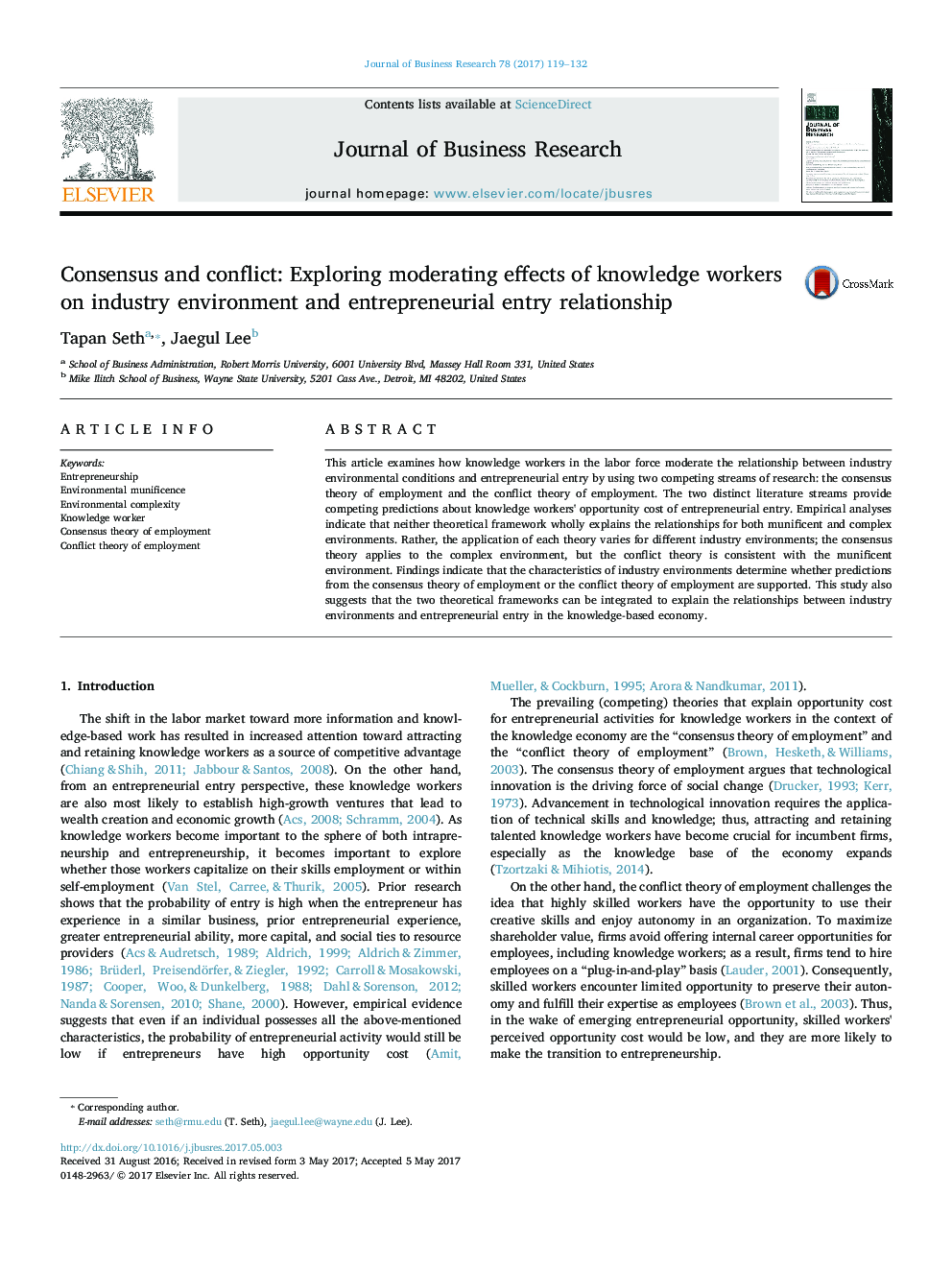| کد مقاله | کد نشریه | سال انتشار | مقاله انگلیسی | نسخه تمام متن |
|---|---|---|---|---|
| 5109592 | 1482843 | 2017 | 14 صفحه PDF | دانلود رایگان |
عنوان انگلیسی مقاله ISI
Consensus and conflict: Exploring moderating effects of knowledge workers on industry environment and entrepreneurial entry relationship
ترجمه فارسی عنوان
توافق و درگیری: بررسی اثرات تعدیل کننده کارگران دانش بر محیط صنعتی و روابط کارآفرینی
دانلود مقاله + سفارش ترجمه
دانلود مقاله ISI انگلیسی
رایگان برای ایرانیان
کلمات کلیدی
کارآفرینی، محرمانگی محیط زیست، پیچیدگی محیطی، کارگر دانش، تئوری توافق در مورد اشتغال، تضاد تئوری اشتغال،
ترجمه چکیده
این مقاله بررسی چگونگی استفاده از دانش کارگران در نیروی کار در رابطه با محیط زیست صنعتی و ورود کارآفرینی را با استفاده از دو جریان رقابتی تحقیق می دهد: نظریه اجماع کار و نظریه منازعه اشتغال. دو جریان ادبی متمایز، پیش بینی های رقابتی در مورد فرصت فرصت دانش کارگر برای ورود کارآفرینی را ارائه می دهند. تجزیه و تحلیل تجربی نشان می دهد که نه چارچوب نظری به طور کامل روابط را برای هر دو محیط محکم و پیچیده توضیح می دهد. بلکه کاربرد هر نظریه برای محیط های صنعتی مختلف متفاوت است؛ نظریه اجماع به محیط پیچیده اعمال می شود، اما نظریه جنگ، سازگار با محیط محکم است. یافته ها نشان می دهد که ویژگی های محیط های صنعتی تعیین می کند که آیا پیش بینی های نظریه اجماع کار و یا نظریه تعارض اشتغال حمایت می شوند. این مطالعه همچنین نشان می دهد که دو چارچوب نظری می تواند یکپارچه سازی شود تا رابطه بین محیط های صنعتی و ورود کارآفرینی در اقتصاد مبتنی بر دانش را توضیح دهد.
موضوعات مرتبط
علوم انسانی و اجتماعی
مدیریت، کسب و کار و حسابداری
کسب و کار و مدیریت بین المللی
چکیده انگلیسی
This article examines how knowledge workers in the labor force moderate the relationship between industry environmental conditions and entrepreneurial entry by using two competing streams of research: the consensus theory of employment and the conflict theory of employment. The two distinct literature streams provide competing predictions about knowledge workers' opportunity cost of entrepreneurial entry. Empirical analyses indicate that neither theoretical framework wholly explains the relationships for both munificent and complex environments. Rather, the application of each theory varies for different industry environments; the consensus theory applies to the complex environment, but the conflict theory is consistent with the munificent environment. Findings indicate that the characteristics of industry environments determine whether predictions from the consensus theory of employment or the conflict theory of employment are supported. This study also suggests that the two theoretical frameworks can be integrated to explain the relationships between industry environments and entrepreneurial entry in the knowledge-based economy.
ناشر
Database: Elsevier - ScienceDirect (ساینس دایرکت)
Journal: Journal of Business Research - Volume 78, September 2017, Pages 119-132
Journal: Journal of Business Research - Volume 78, September 2017, Pages 119-132
نویسندگان
Tapan Seth, Jaegul Lee,
